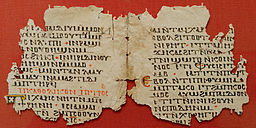The Bible contains a lot of questions, and it doesn’t always provide satisfactory answers. So I’ve been answering some of the Bible’s questions myself. This time, I’m looking at questions from around the time the Israelites first settled in the promised land.
The son of a priest asks the tribes that chose to stay on the other side of the Jordan: Are you now turning away from the Lord? Answer: No.
Deborah and Barak ask: Why did the tribe of Reuben stay among the sheep pens, and why did Dan linger by the ships, etc.? Answer: Because God only told Barak to take Naphtali and Zebulun with him.
Gideon asks: If the Lord is with us, why has all this happened to us? Answer: Because he hates you.
Gideon asks the Ephraimites: What have I accomplished compared to you? Answer: Much with little, compared to much with much.
Abimelek asks the people of Shechem: Which is better for you, to have all 70 of Gideon’s sons rule over you, or just one? Answer: Distributing the power among many people sounds good to me.
Jotham asks: Have you acted honorably and in good faith by making Abimelek king? Have you been fair to Gideon and his family? Have you treated Gideon as he deserves? Answer: Abimelek is Gideon’s son, so what’s the problem? (Unless it’s the murder thing, in which case, why didn’t you mention that?)
An angel asks Samson’s father: Why do you ask my name? Answer: He just told you. So they can honor you when your word comes true.
Naomi asks: Why call me Naomi? Answer: Because your name’s Naomi.
Boaz asks: Who does that young woman belong to? Answer: Her husband is dead, so I guess that makes her free and owned by no one.
Samuel’s father asks his wife Hannah: Why are you weeping? Why don’t you eat? Why are you downhearted? Answer: You know why. Because she has no children. Also because your other wife is tormenting her.
He also asks her: Don’t I mean more to you than ten sons? Answer: Apparently not. What kind of question is that, anyway?
Eli asks Hannah: How long are you going to stay drunk? Answer: Zero minutes.
Eli asks: If one person sins against another, God may mediate for the offender; but if anyone sins against the Lord, who will intercede for them? Answer: Well, according to the Bible, Moses can intercede between God and humans. But there is no one who can intercede between God and humans. But prophets can do it. Like Samuel. And so can Job’s friend, whoever that is. But only Jesus can intercede between God and humans. And so can the Spirit. But only people who aren’t God can intercede between God and humans. Paul and Timothy can do it. And so can men everywhere, apparently.
Joshua’s questions
Joshua asks: Alas, Sovereign Lord, why did you ever bring this people across the Jordan to deliver us into the hands of the Amorites to destroy us? Answer: Uh… because that’s where the Amorites were! Where else would he bring you to deliver you into the hands of the Amorites to destroy you?
Joshua asks: What can I say, now that Israel has been routed by its enemies? Answer: You can say “Alas, Sovereign Lord, why did you ever bring this people across the Jordan to deliver us into the hands of the Amorites to destroy us?”
Joshua asks God: After the Canaanites have wiped us out, then what will you do to maintain your good name? Answer: Judging by the kind of thing God tends to say about Israel, I expect he would claim that Israel was evil and that he was a hero for getting rid of them.
Joshua asks Achan: Why have you brought this trouble on us? Answer: Because he wanted the plunder. But a better question is: Why did GOD bring this trouble on them by giving them that pointless rule in the first place, and then only revoking it after it was too late?
Joshua asks the Gibeonites who he would have killed if they hadn’t tricked him into promising not to: Why did you deceive us? Answer: Duh.
Joshua, the leader of Israel, asks the Israelites: How long will you wait before you take possession of the land God has given you? Answer: As long as you wait to tell them to.
God’s questions
God asks Joshua: What are you doing down on your face? Answer: Idolatry. He’s doing idolatry.
God asks his people: I said you should not make a covenant with the people of this land, yet you have disobeyed me. Why have you done this? Answer: By accident.
God asks Gideon: Am I not sending you? Answer: …Are you? I thought an angel was.
God asks Eli: Why do you scorn my sacrifice and offering that I prescribed for my dwelling? Answer: He doesn’t, his sons do.
He asks Eli: Why do you honor your sons more than me by fattening yourselves on the choice parts of every offering made by my people Israel? Answer: Because God said the priests were to live on the parts of the offerings that weren’t burned up.
Continue reading The Bible’s questions, answered—part 3: Answers to questions from pre-monarchy Israel →
